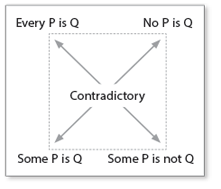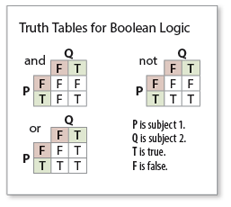98
Understanding the Basic Elements
Arguments consist of three basic elements: premises, inferences, and conclusions.
Using Premises
Premises are statements assumed to be true and presented as evidence in support of a claim. The argument does not try to prove the truth of a premise but just takes it to be true: 
The two premises above are assumed to be true. The argument does not try to prove the premises but rather uses them to draw its conclusion or claim.
Drawing Inferences and Conclusions
An inference is a statement that is derived from previous statements—whether premises or other inferences. The truth of an inference is based on both the truth of the previous statements and on the way the inference is derived.
The inference that Anya has passed calculus is based on premises 1 and 2. If Anya has an engineering degree and all engineers have to pass calculus, Anya must have passed calculus.
A conclusion is simply the final inference, derived from previous statements. Here, the concluding inference is that if Anya has passed calculus, she must understand it. A conclusion can become a premise in a new argument.
Your Turn Create your own argument. Begin with this premise: “I am a student.” Add at least one more premise. Then derive at least one inference from the premises. Reach a conclusion derived from a premise and an inference. Afterward, test the truth of your argument.
99
Understanding Logical Rules
Classical logic has created a set of rules for indicating a statement's truth.
Three Classic Laws of Thought
The Greek philosopher Aristotle determined the following three rules of logic:
- Law of identity (the most elemental law): P is P.
- Law of noncontradiction: If P is Q, then it is false that P is not Q.
- If Paul is an editor, it is false that Paul is not an editor.
- Law of excluded middle: Either P is Q or P is not Q—there is no middle possibility.
- Either Paul is an editor, or Paul is not an editor. There is no other possibility.
Four Basic Propositions
To put ideas into categories, Aristotle came up with four basic propositions. (Proposition refers to the content or meaning of a sentence.) Propositions that are diagonal contradict each other, as do the top two propositions.

- Universal affirmative: Every P is Q.
- Every kangaroo is a marsupial.
- Universal negative: No P is Q.
- No kangaroo is a marsupial.
- Particular affirmative: Some P is Q.
- Some kangaroos are marsupials.
- Particular negative: Some P is not Q.
- Some kangaroos are not marsupials.
Three Function Words
Two thousand years after Aristotle, George Boole came up with a system for testing the truth of a claim using three basic words.

- And: P and Q (Both must be true for the statement to be true.)
- Sarah and Janelle are astronomers.
- Or: P or Q (One must be true for the statement to be true.)
- Sarah or Janelle is an astronomer.
- Not: P not Q (P must be true for the statement to be true.)
- Sarah, not Janelle, is an astronomer.
100
Nine Inference Rules
In addition to rules about the truth or falsity of a statement, classical logic includes a set of rules for making inferences and conclusions. As you develop your logical arguments, use the rules below to make inferences.
- Modus Ponens
(The way that affirms)
If P then Q. P. Therefore Q. - If Sue is here, then Ty is here.
- Sue is here.
- Therefore Ty is here.
- Modus Tollens
(The way that denies)
If P then Q. Not Q. Therefore Not P. - If Bob agrees, then Teri agrees.
- Teri does not agree.
- Therefore Bob does not agree.
- Hypothetical Syllogism
If P then Q. If Q then R. P. Therefore R. - If I laugh, then Duke barks.
- If Duke barks, then Polly squawks.
- I laugh.
- Therefore Polly squawks.
- Disjunctive Syllogism
Either P or Q. Not P. Therefore Q. - Either you win or I win.
- I do not win.
- Therefore you win.
- Constructive Dilemma
If P then Q, and if R then S. P or R. Therefore Q or S. - If I go, he goes; and if she goes, they go.
- I go, or she goes.
- Therefore he goes, or they go.
- Destructive Dilemma
If P then Q, and if R then S. Not P and Not R. Therefore Not Q and Not S. - If I go, he goes; and if you go, they go.
- I do not go, and you do not go.
- Therefore he does not go, and they do not go.
- Simplification
P and Q. Therefore P. - Spot is a dog and Rex is a dog.
- Therefore Spot is a dog.
- Conjunction
P. Q. Therefore P and Q. - Spot stinks.
- Rex stinks.
- Therefore Spot stinks and Rex stinks.
- Addition
P. Therefore P or Q. - Spot stinks.
- Therefore Spot stinks or Rex stinks.
Your Turn Write your own examples for the inference patterns on this page. What does this activity teach you about logical inferences for arguments?





